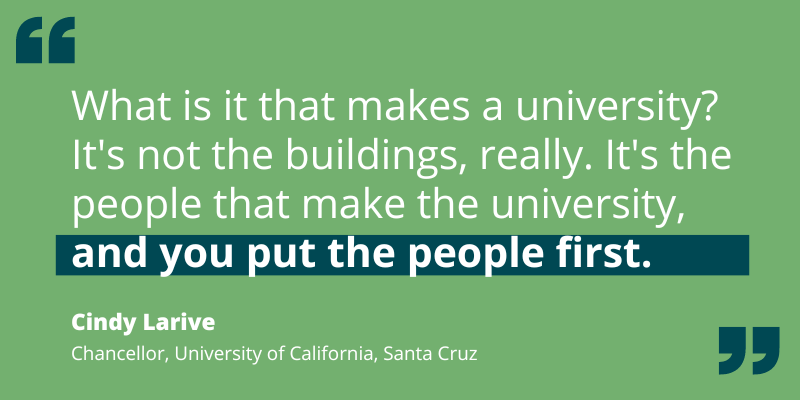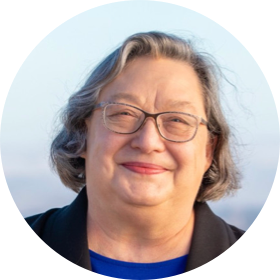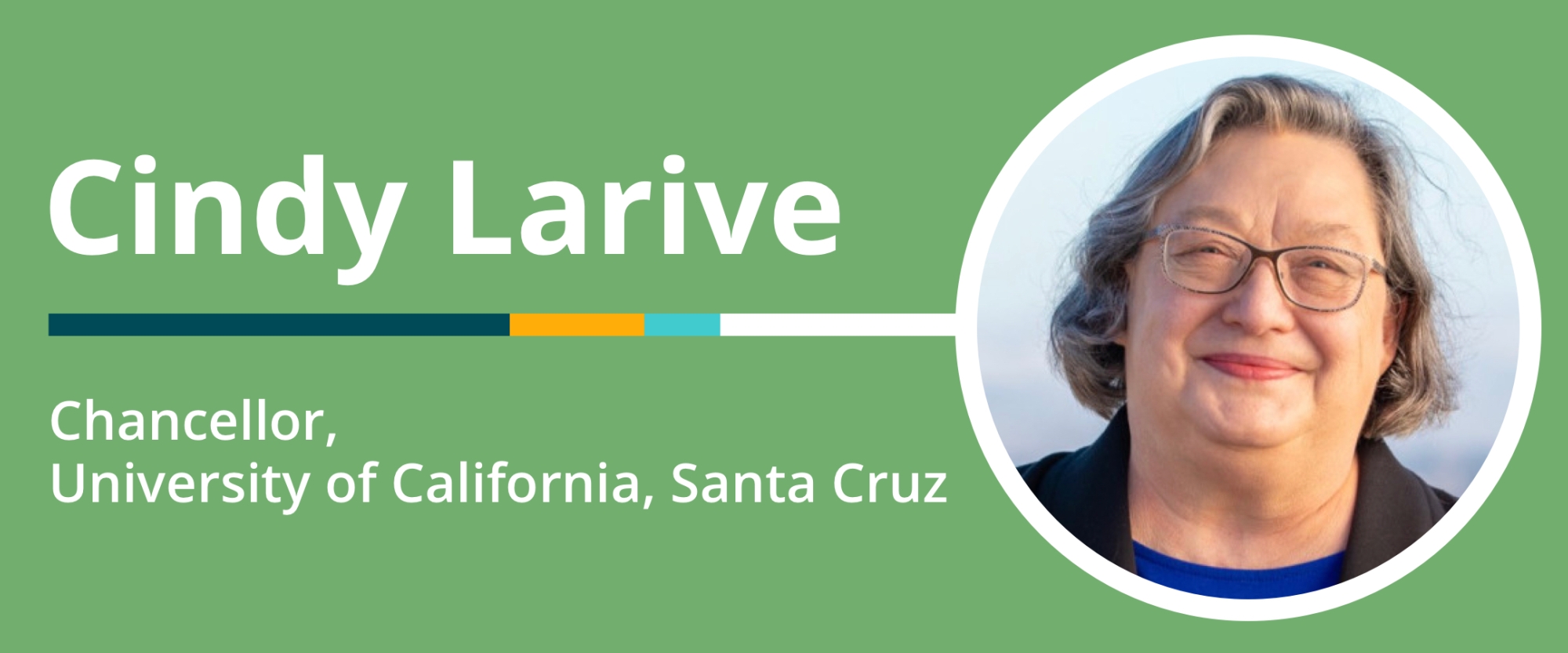The University of California, Santa Cruz (UCSC) is world-renowned for its progressive values and unconventional approaches, and the University Innovation Alliance (UIA) invited UCSC Chancellor Cindy Larive to share some of this on our Weekly Wisdom Podcast. She spoke about how she went from avoiding to embracing administrative leadership, the pandemic's lessons about collaboration and community, and her view of what it will take to reenergize higher ed.
Leadership Opportunities Are Everywhere
For most of her years working in higher education, Chancellor Larive was more interested in being a faculty member and lab administrator than moving into campus leadership. As she put it, "I really like doing science." It was only after becoming department chair that she recognized the possibilities for broader impact on her students and colleagues:
"Every time I step in front of a classroom, I'm the leader of that experience. Through our research, we're leaders. Through our engagement with our professional communities, we are leaders. Faculty is a leadership role. I prefer to talk about leadership rather than administration, because administration connotes bureaucracy. There is some bureaucracy to running a university. We can't escape that. But by leading, you actually empower others to join you in transformation. That's exciting, and that's a reason to think about leadership and to partner with your leaders. We can do more together when we come together to work on behalf of our mission.
"When I became provost, I thought, 'I don't know how to be a provost. All I really know how to do is run a research group.' So I acted like I was running my research group. And when you have a whole group of people who come together, you think together. So, leadership is listening deeply, engaging with others, valuing collaboration and partnership, and encouraging everybody else on the team to work together in a solutions-oriented way."
She noted that her former boss, UC Riverside's chancellor Kim Wilcox, is now her peer, adding:
"He's a great friend and mentor, but all the way along, I haven't thought about having a boss. When you're a faculty member, you're your own boss. Even now, I have a boss, President Drake of the UC system, but I think the way I engage is in partnership. So if you think about your boss as your partner to have impact, to make change, to do good things, that's a very different way of thinking than, 'I have to make my boss happy or like me.' You're partners in transformation.
"Controlling your own destiny sounds lonely. How do you accomplish things all by yourself? The way you do it is by partnering with other people and then really being able to move an agenda forward."
Translating Administrative Decisions Into Campus-Wide Action
Like many other higher ed leaders, Chancellor Larive had to think on her feet as COVID-19 radically altered how a large institution had to function. She quickly recognized that certain hierarchical modes of operation don't work very well in a pandemic:
"We had to bring together teams with different expertise, make decisions in real time, translate those decisions into actions, and then be able to communicate broadly about what we were doing. That's a different paradigm than universities typically operate under. Decisions trickling down from the top aren't a very effective way to get buy-in or to operate with speed and scale. We learned those lessons because we had to. Now we can take that advantage and do it in a more efficient and satisfying way that leads to action."
Working with a leadership team that shared a collaborative mindset, Chancellor Larive was able to make a $20 million campus budget cut as painless as it could reasonably be:
"We brought the whole team together to do scenario planning, and it became really obvious to everybody that a budget cut to one division, whether it's academic or IT or student affairs, has downstream effects on every other part of the university. Luckily, we didn't have to do all that. We instead managed to take one-time cuts, not permanent cuts, and that bet played out for us. But the process of thinking that through together under duress really, I think, brought the leadership team closer together and gave people an appreciation for the contributions that others make."
Meanwhile, a complex of wildfires in the Santa Cruz Mountains came within a mile and a half of the campus. Chancellor Larive recalled:
"Luckily, by some miracle, the wind shifted overnight and the campus was spared. But that whole process of evacuating, the trauma to people in our community still remains. We had 1,000 people lose their homes. We had staff members working to support evacuated students or their own families were being evacuated. And then the process of bringing everybody back to campus was the hardest thing that we've done. That experience helped me really get in touch with my own feelings, how I felt about our campus and how valuable it is, and then think about what is it that makes a university. It's not the buildings, really. It's the people that make the university, and you put the people first."

Reenergizing Higher Ed
The world may have hit pause during two years of lockdown, but it was hardly the same as taking an intentional, much-needed vacation. Those of us in higher ed continue to notice a lack of purpose, inspiration, and community in our work. We asked Chancellor Larive her thoughts about keeping people engaged, focused on what they have to do today, and hopeful about what's ahead, and she spoke about the transformational power of higher education:
"Higher education changed my life from a low-income, first-generation college student. We do that every day at universities. And it is that mission of access, opportunity, and forward-looking change that helps us stay focused on our work. But how we think about our work is changing. At a largely residential campus where students expect a high-touch experience, how do we continue to deliver those experiential, in-person education opportunities mixed with some remote, hybrid, and online educational opportunities? I think we have to value remote, hybrid, and in-person work to keep our culture and stay centered on our values, because it is going to be what's necessary for us to be an employer of choice. How do you keep collaboration going when not everybody is in-person? It was easier for us when we were all remote.
"I think we can manage it. It is going to be a matrix of possibility, feelings, communities, and inspirations across the university. If we're really focused on impact, on delivering experience, opportunity, and change that the country needs, that can guide our work, and our partnerships can happen, whether we're across the table or across the Zoom screen. I'm energized by that. We're trying to think about how to navigate it as we've emerged from the pandemic and to help everybody feel valued and part of a team."
Career Advice for Leaders
We always ask our guests about the best advice that has served them in their careers, and Chancellor Larive shared hers:
"It came from my mentor at the University of Kansas, Ted Kuwana. He was a senior faculty member who told me you have to remember that it's not about science. It's all about the people, that the people are the most important thing. So I try to keep that to heart. If you put the people first in making difficult decisions and planning for the university, then pretty much everything else will fall into place."
Given that Chancellor Larive spent so many years resisting the idea of moving from a faculty to leadership position, we asked what she might say to rising leaders knowing what she knows now:
"Be open and let other people know you're interested. We have a program in the UC system called Coro, which brings people together around collaborative leadership. ACE has a faculty fellows program. So there are a lot of opportunities to show that you're interested and focus on making a difference. When somebody needs a chair for a task force or a committee, step forward. I think if you can show that you're a solutions-oriented good partner, opportunities can come your way."
Note: This interview in the Weekly Wisdom Series originally aired on April 18, 2023 as part of the University Innovation Alliance’s Innovating Together Podcast, appearing live on Facebook, Twitter, and LinkedIn.
Links Mentioned in This Episode
• University of California, Santa Cruz
• University Innovation Alliance
• Chancellor Cindy Larive
• Weekly Wisdom Podcast
• Kim Wilcox ("The Impact of Alliances in Higher Education: A Conversation With Kim Wilcox, Chancellor, University of California, Riverside" UIA, 9/2/21)
• UC President Michael Drake ("Focusing on the Present to Serve the Future: A Conversation With Michael Drake, Former President, Ohio State University" UIA, 12/10/20)
• Ted Kuwana (Emeritus Distinguished Professor, Department of Chemistry, University of Kansas; Chancellor Larive's mentor early in her career)
• Coro (a faculty leadership development program within the University of California system)
• ACE Fellows Program (a leadership program by the American Council on Education)
Bios of Guest and Co-Hosts

Guest: Cindy Larive, Chancellor, University of California, Santa Cruz
Since 2019, Dr. Cynthia K. Larive has served as the 11th chancellor of the University of California at Santa Cruz. Throughout her career, she has been committed to student success, inclusion, and equity, leading programs for undergraduate research and curricular innovation, writing extensively on active and experiential learning and mentoring, and encouraging women and other underrepresented groups to enter the STEM fields. She elevated the role of UCSC's chief diversity officer and restructured the Office of Student Affairs and Success to align with her goals. An accomplished bioanalytical chemist, Chancellor Larive is also focused on research, innovation, and developing the next generation of entrepreneurs through the campus Center for Innovation and Entrepreneurial Development, as well as regional partnerships in the Monterey Bay and Silicon Valley areas. Dr. Larive came to UC Santa Cruz from UC Riverside, where she was most recently Provost and Executive Vice Chancellor, previously serving as Vice Provost for Undergraduate Education, Divisional Dean of Physical Sciences and Mathematics, and Interim Dean of the College of Natural and Agricultural Sciences. She has authored more than 155 research publications, and has received research grants from federal agencies, foundations, and corporations. Dr. Larive is a first-generation college graduate, earning her BS from South Dakota State University and her MS from Purdue University, both in chemistry. She earned her Ph.D. in analytical chemistry from UC Riverside while raising daughters Erin and Megan with husband Jim.

Co-Host: Bridget Burns, Executive Director, University Innovation Alliance
Dr. Bridget Burns is the founding Executive Director of the University Innovation Alliance (UIA). For the past decade, she has advised university presidents, system chancellors, and state and federal policy leaders on strategies to expand access to higher education, address costs, and promote completion for students of all backgrounds. The UIA was developed during Bridget’s tenure as an American Council on Education (ACE) Fellowship at Arizona State University. She held multiple roles within the Oregon University System, including serving as Chief of Staff and Senior Policy Advisor, where she won the national award for innovation in higher education government relations. She was a National Associate for the National Center for Public Policy and Higher Education, and has served on several statewide governing boards including ones governing higher education institutions, financial aid policy, and policy areas impacting children and families.

Co-Host: Doug Lederman, Editor and Co-Founder, Inside Higher Ed
Doug Lederman is editor and co-founder of Inside Higher Ed. With Scott Jaschik, he leads the site's editorial operations, overseeing news content, opinion pieces, career advice, blogs and other features. Doug speaks widely about higher education, including on C-Span and National Public Radio and at meetings and on campuses around the country. His work has appeared in The New York Times and USA Today, among other publications. Doug was managing editor of The Chronicle of Higher Education from 1999 to 2003, after working at The Chronicle since 1986 in a variety of roles. He has won three National Awards for Education Reporting from the Education Writers Association, including one for a 2009 series of Inside Higher Ed articles on college rankings. He began his career as a news clerk at The New York Times. He grew up in Shaker Heights, Ohio, and graduated in 1984 from Princeton University. Doug and his wife, Kate Scharff, live in Bethesda, MD.
About Weekly Wisdom
Weekly Wisdom is an event series that happens live on Facebook, Twitter, and LinkedIn. It also becomes a podcast episode. Every week, we join forces with Inside Higher Ed and talk with a sitting college president or chancellor about how they're specifically navigating the challenges of this moment. These conversations will be filled with practicable things you can do right now by unpacking how and why college leaders are making decisions within higher education. Hopefully, these episodes will also leave you with a sense of optimism and a bit of inspiration.
Rate, Review & Subscribe
Learn why hundreds of people have rated this new podcast 5 stars! Please join others and rate and review this podcast. This helps us reach and inform more people -- like you -- to help increase the number and diversity of college graduates in the United States.
Click here, scroll to the bottom, tap to rate with five stars, and select “Write a Review.” Then be sure to let us know what you loved most about the episode! Also, if you haven’t done so already, subscribe to the podcast. We’ll be adding a bunch of bonus episodes to the feed and, if you’re not subscribed, there’s a good chance you’ll miss out.

